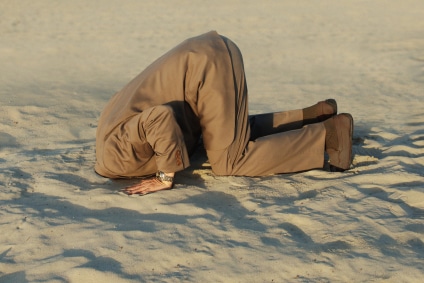Like a bad horror movie villain, global cooling is the skeptic meme that just won’t die. The latest “respectable” media figure to perpetrate that myth is Newsweek and The Washington Post columnist George F. Will, who wrote a global warming piece last Sunday that was roundly denounced by scientists and bloggers alike for its gross factual errors.
The Wonk Room’s Brad Johnson has been doing yeoman’s work cataloguing the many obvious inaccuracies over the last few days – you can see the latest tally here, courtesy of Think Progress – even going so far as to offer Will’s editors, who have yet to issue an apology or revise the original column, a perfectly acceptable correction.
While I would expect such antics from Will, a well-known conservative and global warming skeptic, I find it deeply disturbing, albeit not entirely surprising, that the editorial board of one of the country’s most prominent newspapers would refuse to admit such a flagrant mistake – let alone publish such garbage in the first place – and issue an immediate correction. I understand that many media “elites” still bristle at the notion that blogging has become a respectable platform – hence their well-worn aversion to responding to criticisms from bloggers – but ignoring actual scientific evidence smacks of journalistic FAIL.
Putting aside the know-nothing cranks like George Will, my other big complaint about global warming coverage has been the media’s near myopic on providing so-called “balance” – the misguided notion that, for every article about the impacts of climate change, there should be another one questioning the consensus (preferably citing the likes of Bjorn Lomborg, John Coleman, and their fellow travelers at the American Enterprise Institute and the National Association of Manufacturers).
Though things as a whole have vastly improved in recent years, many reporters continue to struggle with this idea – some more so than most, of course – while others, lacking the requisite knowledge or simply chasing the latest headlines, fail to do the science justice. Now while I don’t expect all environmental reporters to have post-graduate degrees in climate science, they should be knowledgeable enough to provide some context and background when writing about the latest Nature study (Time’s Eric Pooley wrote a great piece about this).
As much as I wish it weren’t so, George Will is hardly the first writer to touch on global cooling in recent months. Joe Romm and the Real Climate team have blogged at length about the media’s tendency to seize on short-term weather or climate patterns – a brief cold spell here, an extremely warm period there – and make grand predictions or statements about climate change.
Last year, skeptics so hyped up reports showing that January had been slightly colder than usual that many reporters, including thoughtful ones such as The New York Times’ Andrew Revkin, felt compelled to write about it. Never mind the fact that a single blip in a decades-long process is hardly worth the mention – even if it happens to follow the warmest blip on record.
Which is why I had to laugh when I read Romm’s post, entitled, “Breaking news: Unprecedented global warming in past year.” While it did end on a serious note, this post is a perfect encapsulation of the breathless, short-sighted coverage we often see in the mainstream media. Instead of explaining the larger trends, or at least providing some context, a reporter might simply hone in on the numbers: a 0.37°C year on year temperature rise, or 20 times the annual rate of warming in recent decades.
Leaving aside the jokey elements here, Romm does use these numbers to make a larger point about the predicted long-term global warming trends:
“I should note that the National Climatic Data Center has this as the 7th warmest January (see here), with year-over-year warming of ‘only’ 0.35°C.
Note also that we are still experiencing La Niña conditions, which tend to slightly cool global temperatures.
Now what could really make this a genuinely serious emerging storyline is that in the summer of 2007, the Hadley Center made some interesting near-term predictions in Science (see “Climate Forecast: Hot — and then Very Hot“). They pointed out that in addition to the steady increase in anthropogenic warming from greenhouse gases you have to add a smaller variation from climate oscillations linked to the oceans. Those oscillations have been tamping down temperatures a tad, and may keep doing so for the next year or so, but the decade of the 2010s is going to bring a return to record-smashing temperatures.”
To put it more bluntly: While we always want to avoid making a mountain out of a molehill, the media needs to recognize two critical facts: a) global cooling doesn’t exist, and b) one month, or year, of slightly unusual temperatures does not a trend make. We know global warming is real because it is a decades-long process that has been well-documented and studied over the last half-century.
Despite what the skeptics would have you believe, there isn’t, and never was, a cooling “consensus.” Studies published during the 1970s that predicted a period of intense cooling – a mini-ice age of sorts – were quickly disproven with the arrival of better, more accurate data. Citing those studies grossly misrepresents the state of modern climate science, since – and I know this will shock some people – researchers’ understanding of these processes have radically changed since the 70s.
The next time you try to mislead your readers, George, make sure your “evidence” is up to date.
This month we’re giving away FREE copies Nobel Laureate Dr. Andrew Weaver’s new book Keeping Our Cool: Canada in a Warming World.
Go here to find out more details about DeSmogBlog’s monthly book give-away.
Subscribe to our newsletter
Stay up to date with DeSmog news and alerts







